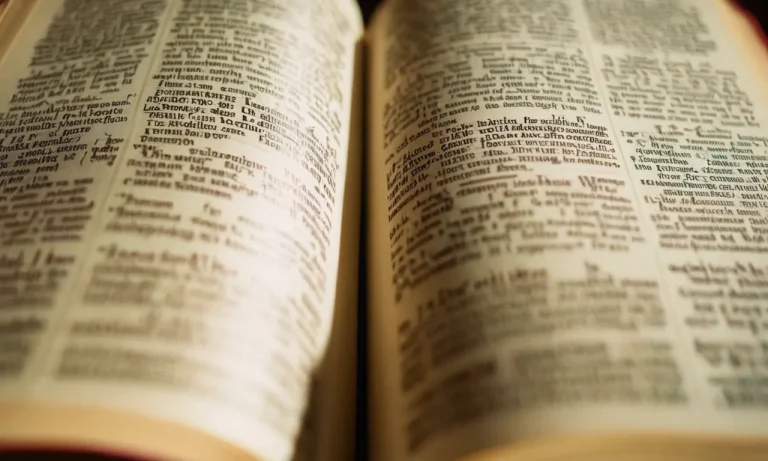God Will Repay Those Who Hurt You
Have you ever been deeply hurt by someone and wondered if you’ll ever get justice? This is a common human experience – we all face mistreatment at times. You may feel powerless, but take heart: according to multiple faith traditions, divine justice awaits.
The Concept of Divine Justice
God Sees and Remembers All Wrongs
The Bible teaches that God is omniscient – He sees and knows everything that happens (Psalm 139:1-6). No wrong deed escapes His notice. He may seem silent for a period, but He does not forget. The cries of the oppressed reach His ears (Exodus 3:7).
As the righteous Judge, God keeps perfect records and will call every person to account for their actions, whether good or bad (Ecclesiastes 12:14).
Every Deed Will Be Repaid
The Bible warns that no sin will go unpunished (Proverbs 11:21). God is perfectly holy and just, He hates all wickedness and will not let any injustice slide. His justice demands wrongs to be set right.
While we may not see it immediately, divine justice will eventually catch up as God repays each one according to what they have done (Jeremiah 17:10; 32:19). The message is sobering – for every careless word or deed, each will give an account on judgment day (Matthew 12:36).
Divine Justice May Not Be Immediate
God’s timing is not limited to our human perspective. His divine justice operates on His timeframe, which may not match our expectations. Ezekiel 18:30-32 explains that God takes no pleasure in punishing the wicked, but desires all to turn from sin and live.
However, when stubborn unrepentance remains, His judgment will come. While waiting is painful, God’s patience means more time for repentance and salvation (2 Peter 3:9).
Divine justice provides hope that ultimately, right will triumph over wrong. God has appointed a day when He will judge the world with justice through Jesus Christ (Acts 17:31). Wrongs will be made right. This truth upholds morality in society.
Though justice may seem delayed, the all-seeing God does not forget. His righteous judgment and timing are perfect. In due time, He will repay.
Biblical Support for the Principle
Old Testament Passages on God’s Justice
The Old Testament contains many passages that speak of God’s justice and His judgment against those who commit evil and hurt others. Here are some key verses:
- “The Lord is known by his justice; the wicked are ensnared by the work of their hands” (Psalm 9:16). This shows that God will judge the wicked for their evil actions.
- “Yet the Lord longs to be gracious to you; therefore he will rise up to show you compassion. For the Lord is a God of justice” (Isaiah 30:18). God is gracious but also just.
- “But you, God, see the trouble of the afflicted; you consider their grief and take it in hand. The victims commit themselves to you; you are the helper of the fatherless” (Psalm 10:14). God cares for the hurting and oppressed.
- “The Lord works righteousness and justice for all the oppressed” (Psalm 103:6). He brings justice against oppressors.
- “For I, the Lord, love justice” (Isaiah 61:8). Justice flows from God’s loving nature.
These verses make it clear that throughout the Old Testament, God is presented as a God of justice who will ultimately make right all wrongs and repay those who injure others.
New Testament Passages on God’s Justice
The New Testament also frequently refers to God’s justice and judgment against sin:
- “Do not take revenge, my dear friends, but leave room for God’s wrath, for it is written: ‘It is mine to avenge; I will repay,’ says the Lord” (Romans 12:19). God will repay evildoers Himself.
- “He will punish those who do not know God and do not obey the gospel of our Lord Jesus” (2 Thessalonians 1:8). Judgment awaits those who reject Christ.
- “Nothing in all creation is hidden from God’s sight. Everything is uncovered and laid bare before the eyes of him to whom we must give account” (Hebrews 4:13). We are accountable to the all-seeing God.
- “And I saw the dead, great and small, standing before the throne, and books were opened. Another book was opened, which is the book of life. The dead were judged according to what they had done as recorded in the books” (Revelation 20:12). God will judge all people’s deeds.
- “God is just: He will pay back trouble to those who trouble you” (2 Thessalonians 1:6). God repays trouble to those who hurt His people.
We see the consistent message that God is perfectly just and will repay and judge all sin. While this happens fully in the afterlife, even in this age God works to defend and vindicate those who suffer injustice.
How to Respond When Hurt by Others
Turn to God in Prayer
When someone hurts us, it’s natural to want justice and vent our pain. But the healthiest response is turning to God first in prayer (Psalm 142:2). Tell God exactly how you feel – He can handle it! Pour out your heart to your heavenly Father.
Pray for Him to heal the pain and give you wisdom in the situation. Ask Him to bless the person who harmed you (Luke 6:28). Releasing the situation to God through prayer is freeing and prevents bitterness from taking root.
According to a 2022 survey by Pew Research Center, 55% of U.S. adults say they pray daily. Studies show prayer can reduce anxiety, lower blood pressure, and help shift our thought patterns.Lifting the hurt to God allows His supernatural peace to guard your heart (Philippians 4:6-7).
Practice Forgiveness, But Don’t Enable Future Harm
Jesus calls believers to forgive others as He has forgiven us (Matthew 6:14-15; Ephesians 4:32). Forgiveness sets us free from bitterness. However, forgiveness doesn’t necessarily mean allowing continued mistreatment. Healthy boundaries are appropriate.
If someone refuses to repent of abusive behavior, we can forgive them internally but restrict contact. We should not enable sinful conduct that harms us or others (Proverbs 19:19). This requires God’s discernment.
Forgiveness also doesn’t mean instantly trusting someone again. Trust must be re-earned over time. According to psychologist Dr. Janis Abrahms Spring, “Forgiveness is letting go of the past. Trust has to do with the future.”
Even if we can’t restore the relationship, we can still forgive and release the person from our judgment.
Trust God to Balance the Scales
“Vengeance is mine, I will repay, says the Lord” (Romans 12:19). Since we are not the ultimate judge and jury, we can trust God to make wrongs right in His perfect timing. While God may discipline us when needed, He promises to avenge those who harm His children (Deuteronomy 32:35).
When we try taking matters into our own hands, we may overreact in anger and create more hurt.
Rather than obsessing over payback, we can release the situation to God, knowing nothing escapes His notice (Hebrews 4:13). He is able to use painful experiences for ultimate good (Romans 8:28). As Corrie Ten Boom said, “Forgiveness is an act of the will, and the will can function regardless of the temperature of the heart.”
This takes faith in God’s sovereignty and care for us.
Objections and Counter-Arguments
The Problem of Present Evil
One common objection to the idea that God will repay those who hurt others is the problem of present evil. If God is just, why do bad things happen to good people now? This is a complex issue that has challenged theologians and philosophers for centuries.
However, several responses can provide perspective.
First, God may allow present evils to accomplish greater goods that we cannot yet see. For example, hardship can help develop virtues like courage, compassion, and perseverance. Additionally, the Bible explains that humans have free will and sometimes use it to hurt others.
God allows this freedom because authentic love requires free choice.
Furthermore, Scripture promises that God will ultimately vanquish evil and reward the righteous. As C.S. Lewis wrote, “Pain insists upon being attended to. God whispers to us in our pleasures, speaks in our conscience, but shouts in our pain: it is His megaphone to rouse a deaf world.”
Suffering reminds us that this world is not how it ought to be. It points us to hope for God’s redemption.
Calls for Human Vengeance
Some interpret “God will repay” as a call for humans to enact personal vengeance. However, the Bible consistently forbids vengeance by human hands, teaching principles like “Do not take revenge…If your enemy is hungry, feed him” (Romans 12:19-20). Why?
Retaliation often escalates conflict rather than resolving it. It also assumes God’s rightful role as judge.
Instead, Scripture calls us to overcome evil with good, leaving judgment to God. This honors God’s authority while helping end cycles of revenge. As Martin Luther King Jr. wrote, “The old law of an eye for an eye leaves everyone blind.”
Of course, preventing further harm may require confronting evildoers or legal consequences. But the motivation should be protection, not retaliation.
Ultimately, calling for others’ harm hardly models God’s compassion. The truth that God will ensure justice should free us to follow Jesus’ countercultural example of radical grace.
Doubts About Divine Justice
Perhaps the greatest objection is skepticism that divine justice exists at all. When oppressors thrive without consequence, it can severely test faith. Yet there are several reasons to hope.
First, Scripture repeatedly emphasizes God’s moral concern for justice. The Bible’s unfolding story depicts God hearing victims’ cries and intervening on their behalf. God “loves justice” and cares deeply when people are exploited (Psalm 37:28; Isaiah 1:17).
Second, the Bible promises appropriate, though often delayed, judgment. Tyrants ultimately face consequences, even if not immediately (Psalm 73:17-20). Judgement awaits after death (Hebrews 9:27). And Jesus will punish all evil when he returns (Matthew 25:31-46).
Finally, God’s people are called to embody justice now. We have the privilege of joining God’s mission of setting things right in a broken world. Our hope is that the Holy Spirit empowers the justice displayed in Jesus’ life and teaching to spread.
As Martin Luther King Jr. expressed, “The arc of the moral universe is long but it bends toward justice. “ It bends not on its own but because God actively curves it.
Conclusion
In closing, Scripture and faith traditions around the world affirm a coming day when God will repay all the hurt we have suffered. As we wait, we can turn to Him for comfort and choose to release bitterness and trust the Almighty to ultimately right every wrong.
His timing and ways are perfect – we simply need to walk in grace and faith.







